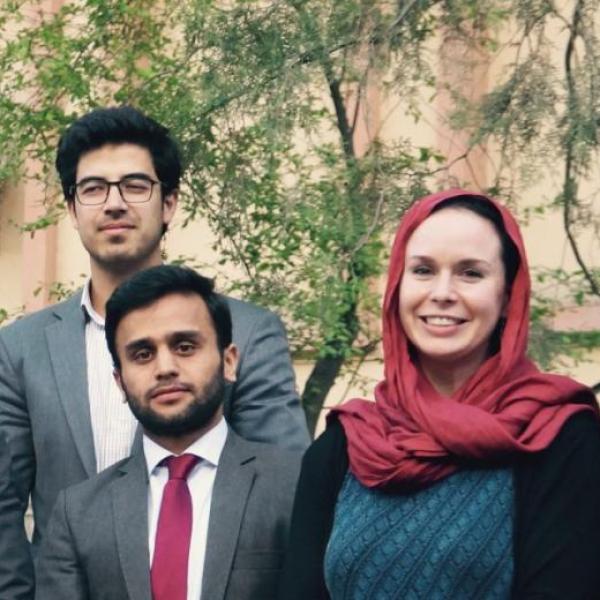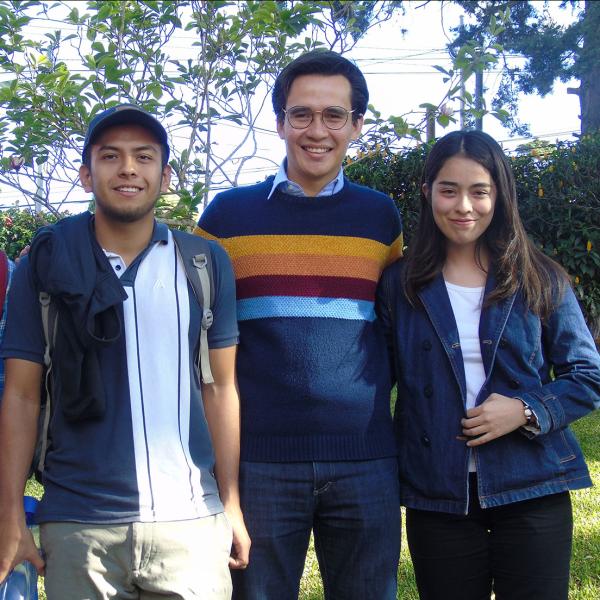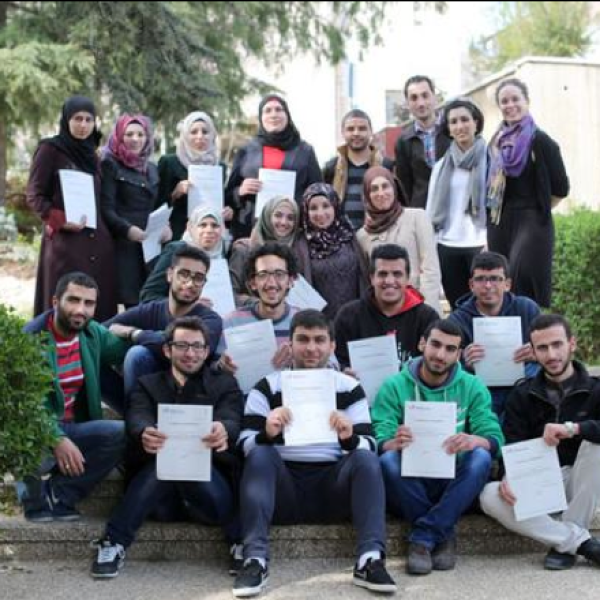
Back
Physics Without Frontiers: Activities
Next

PWF projects are unique, with clearly defined goals and corresponding activities that are designed with a university's or country's specific needs in mind. These may include:
- Schools: PWF organises pedagogical schools and workshops at universities for local undergraduate and master students. The programme aims to expose and train the students in research fields they lack access to, and provide training in transferable computational skills.
- Roadshows: Roadshows are organised by groups of young researchers, passionate about advocating their research field back in their home country. The roadshow centres around intensive one-day activities in universities across the host country, in addition to outreach and public events.
- University Courses: PWF partners with physics and mathematics departments that are unable to teach specific courses due to a lack of resources. The programme facilitates an expert to visit the university to teach the course and where possible train local faculty.
- Online Seminars: PWF offers online seminars on cutting-edge and interesting topics in fundamental physics and mathematics to students and educators worldwide. These are one hour events with a PWF volunteer who is an expert in their field.
- Lecturer Support: PWF offers support to lecturers in developing countries to teach courses in physics or mathematics by providing training courses and resources, and offers support to departments to develop their BSc or MSc curricula.
- Outreach & Diversity: Outreach and communication activities are organised in collaboration with local scientists to encourage young people to study STEM subjects and to support diversity in physics and mathematics, in particular to address the gender gap in STEM.
SCHOOLS
Physics Without Frontiers organises schools on topics in physics and mathematics for undergraduate and master students to provide intense training lasting several days in areas of research that are presently lacking. The schools are organised by groups of scientists who are experts in the field, with it being encouraged that some of them are from the host country and working abroad.
The projects are pedagogical, involving interactive lectures, hands-on sessions, and problem classes. Students' presentations or poster sessions are encouraged.
Public events are often incorporated, to engage the public with physics and mathematics and showcase the student's work. The aim of the schools are to:
- teach and train university students on specific topics in physics or mathematics;
- specifically provide hands-on training through analysis or problem-solving sessions;
- inspire students about careers and opportunities in research;
- provide mentoring and support for students interested in further study;
- connect scientists to universities to facilitate collaboration.
ROADSHOWS
Physics Without Frontiers roadshows are organised in a host country to promote research in physics or mathematics that is lacking. They are organised by a team of PWF Volunteers, including PhD students, postdoctoral researchers and lecturers, passionate about promoting physics, some or all of whom are originally from the host country. The goals of the Physics Without Frontiers roadshows are to:
- Inspire and motivate physics and mathematics undergraduate and master students by introducing them to cutting-edge research, encourage them to continue their studies and consider a career in research.
- Build networks and develop collaboration between the PWF Volunteers, and the faculty members and students at universities in the host country. Collaboration between universities is also strongly encouraged.
- Provide excellent role models to students, and provide continued mentoring and support to interested and motivated students throughout their studies and career.
- Engage and motivate high school students with physics and mathematics, and implement selected outreach and diversity activities.
Roadshows are centred around visiting physics or mathematics departments throughout a host country and exposing students to cutting-edge research they would not otherwise have access to through intensive one-day activities. This may often include:
- advanced level lectures presented by the PWF volunteer team, who are researchers in the given field;
- hands-on sessions, that enable students to analyse real data and discuss the results with experts;
- virtual visits, where the students connect live with researchers at international facilities such as CERN, ICTP, EAIFR, or other scientific institutions;
- careers and opportunities sessions, that provide students with information and advice on further study and career development.
Roadshows also include outreach activities, such as events to engage the public, media and policy makers and raise public awareness about the importance of investing in physics and mathematics education and research; outreach activities are also organised in schools and children centres to engage and excite young people with physics and mathematics.
Topics may include: High energy physics, cosmology, astroparticle physics, condensed matter physics, statistical physics, earth system physics, and mathematics. Other topics will be considered.
The PWF volunteer team often consists primarily of young researchers (PhD or postdoc) originally from the host country, either working there or internationally, who are passionate to promote their field in their home country.
UNIVERSITY COURSES
Physics Without Frontiers partners with physics and mathematics departments in selected universities worldwide that are unable to teach specific courses due to a lack of resources, and offers university courses providing experienced lecturers and teaching assistants at the undergraduate and advanced level.
Courses are offered on subjects such as: General Relativity, Particle Physics, Quantum Mechanics, Optics, Biophysics, Nanotechnology, Topology, Real Analysis, Numerical and Computational Methods, and Practical Programming.
Other courses can be provided depending on the specific needs of the partner university. Ideally, these courses will become part of the regular university curriculum in the partner institute.
The goals of the program are to:
- provide high quality courses in fields that students would otherwise not have exposure to;
- provide mentoring and support for students interested in further study;
- spark further collaboration between the lecturers and postdoctoral teaching assistants, and the faculty members at the partner university;
- train lecturers and teaching assistants at the partner university, where possible, to teach the course for future years.
If you are a lecturer or postdoc and interested to teach a course, you can find out how to apply here by visiting our Volunteer Network page.
ONLINE SEMINARS
Physics Without Frontiers seminars are online talks by PWF Volunteers on cutting-edge areas of research in physics and mathematics. The are typically one hour in duration including a dedicated question and answer session. They are designed to connect students and educators in a school or university in a developing country with an international scientist, in order to inspire and motivate them with physics and mathematics research and inspire students to go onto further study. These may be stand alone events or follow up activities after an in-person PWF activity has taken place.
LECTURE SUPPORT
Physics Without Frontiers provides support to lecturers in physics and mathematics departments in developing countries that lack resources to develop courses, curricula or research programmes. These activities are often part of a comprehensive project where a university course, school, or roadshow has been organised. This is achieved by partnering with departments and working with PWF Volunteers to provide expertise and support. The goals of the programme are to:
- Support lecturers to develop new courses or update current courses by providing training, resources, and materials.
- Support physics and mathematics departments to develop or update their BSc or MSc curricula.
- Build networks and develop collaboration between faculty members and students at the host institution with international scientists and ICTP, and provide expert advice and support for lecturers to develop their research programmes.
OUTREACH & DIVERSITY
Physics Without Frontiers partners with physics and mathematics departments to organise outreach and communication activities, often with a focus on diversity. These activities are often part of a comprehensive project where a university course, school, or roadshow has been organised, or it may be a stand alone project.
Themes of activities may be focused on:
- Inviting the public, media, industry and policy makers to learn more about the university's research programme, inspiring and educating them about physics and mathematics, and promoting networking environments.
- Inspiring young people with current topics in physics and mathematics, and encouraging them to consider further study in STEM subjects.
- Supporting women in physics, by providing role models, organising communication projects, and holding events to discuss issues relating to diversity in physics and mathematics, and providing networking and support environments.
- Reaching out to other less represented groups, such as those from a poorer economic background, ethnic minorities within regions, or those who may lack access due to geographic barriers or isolation within a region.
Activities may include:
- Public events, with invited international and local scientists presenting talks, panel sessions, question and answer sessions, or showcasing physics or mathematics documentaries;
- Visits to local and remote secondary schools to present talks or hands-on activities;
- Exhibitions at local or national festivals, at universities or public spaces;
- Communication projects using the web and social media, or posters for schools;
- Online talks and seminars, or online interactive hands-on sessions.
Supporting Women and Girls in Science:
Read our blog about opening science to women in Nepal, after a PWF public event on women in science at Tribhuvan University.
See our photoessay about women in physics in Palestine which was exhbited at the Royal Society, UK, and various interntional conferences worldwide. The project partnered with the Elsevier Foundation and the Organization for Women in Science for the Developing World (OWSD).



















